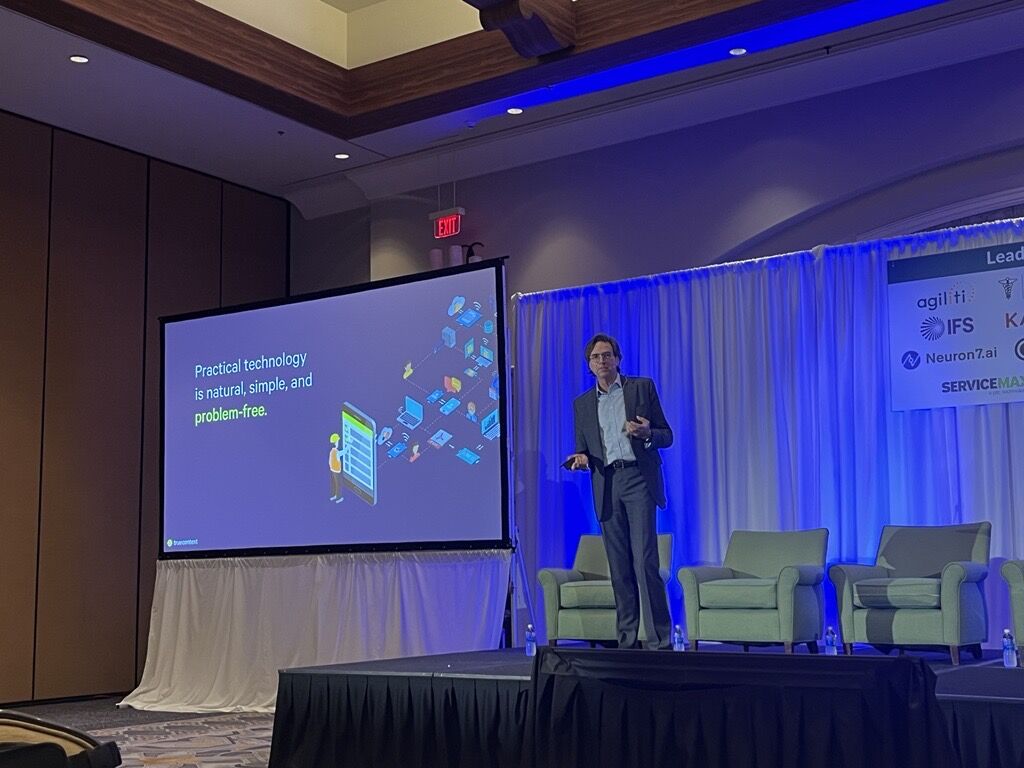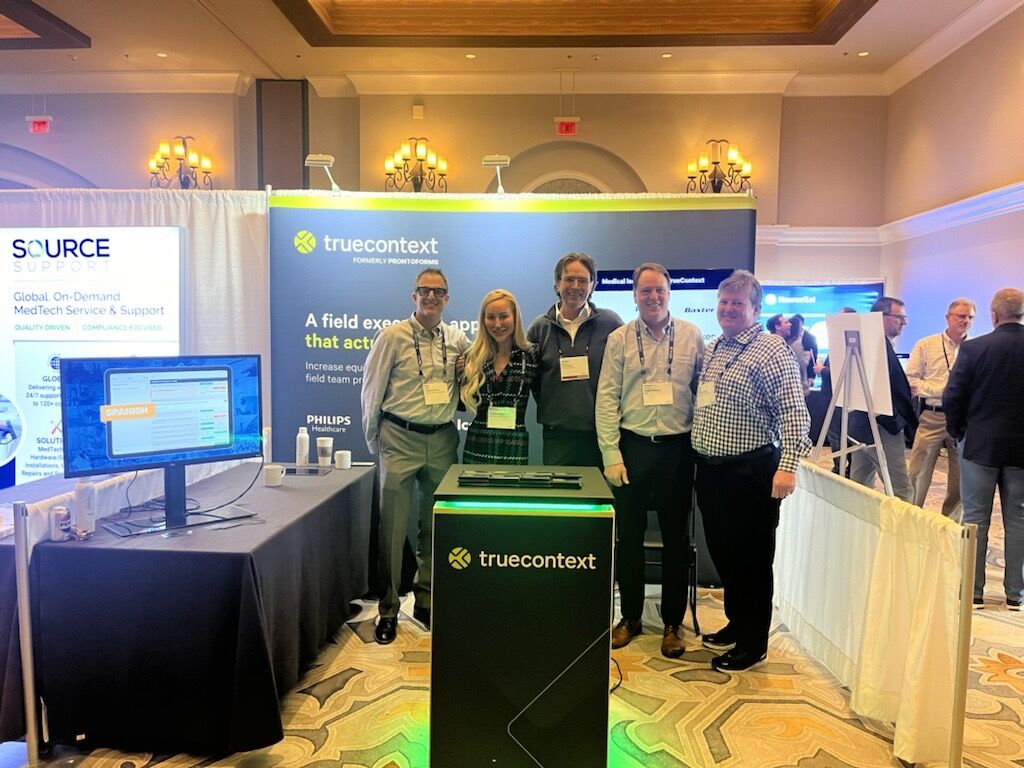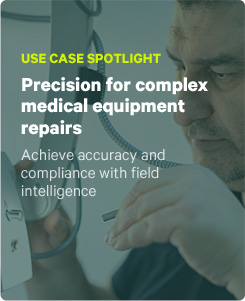I had the pleasure of attending Field Service Medical 2024 earlier this month in Huntington Beach, CA. The annual event sees leaders in medical device field service come together to discuss industry trends, and emerging technology and learn best practices from their peers to deploy within their own teams. TrueContext has maintained a presence at this event for many years now, and we continue to return because of the opportunity to keep our finger on the pulse.
Here are some key takeaways I have from Field Service Medical.
Technology adoption as a part of your field service strategy
Founder & co-CEO of TrueContext Alvaro Pombo kicked off the first day with an address to the audience. During his keynote, he urged the attendees to not just consider technology adoption as the last mile of deployment and testing, but as a central part of field service strategy from the beginning. As you are building your strategy, selecting your technology, and building your solution, how closely tied is it to the true reality of the users?

Put simply, if the technology you are deploying is to help achieve your organization’s strategy, lack of adoption means you were unsuccessful. This is increasingly true when the users are field service technicians. If technicians are frustrated by the solution because it does not serve their reality, they are all but guaranteed to find workarounds. They are resourceful – it’s why they are good at their job. When they work around a piece of technology, you lose the potential outcomes you were striving for in the first place, be it better data, efficiency, safety, or compliance.
Throughout the conference, I saw two primary ways to address this problem: collaborating with your users every step of the way and finding the right partners. Successful field service organizations involve their users every step of the way when deploying solutions. They involve them to understand their team’s strategy, the goals they are striving for, the challenges they face, with the end goal of establishing the processes they need to be successful. Only then can they begin searching for a partner, and that partner must demonstrate how they answer to these needs, and how flexible their solution is to address future changes.
Customer centricity is not a buzzword – it’s table stakes
Attendees at FS Med spoke to customer centricity as giving your customers the ability to choose how they work with your business, and your business having processes to maximize the effectiveness of each of those different interactions. Even in a world of increasingly complex assets, ever-changing regulations, and challenging employment trends, customer expectations are only increasing. Leaders find ways to overcome these macroeconomic challenges with solutions that put the customer at the center, with technology as a way to perform this delicate dance.
Across the conference, there was a central question relevant to every attendee: How will this help me service my customers better? As a solution provider, this was the most important question we could answer.
- For TrueContext, we showcased our ability to enhance field service execution, documentation, and compliance. For the customer, this means faster and more accurate documentation for traceability and compliance, having sign-off power or feedback seamlessly built into processes, even being able to self-serve in less complex workflows, while ensuring compliance is met, and accurate data is captured and documented.
- AI platforms allow you to analyze and extrapolate next steps from any data point and can be applied to any customer-facing interaction, including dynamic scheduling for optimal dispatch, or analyzing customer feedback and service data to continuously enhance service offerings.
- For third-party workforce providers, it’s the ability to serve customers faster and more consistently. No matter where they are, you can meet your SLA and even shorten your time to service for future contracts.|
Above are just a handful of the solutions that were showcased at the event. Refreshingly, the discussions were not focused on feature-functionality and cost – they focused on the utility of the solution and its impact on customer-centricity initiatives.
The opportunity to collaborate, even with competitors and the FDA
In competitive scenarios, collaboration is the last thing that would ever come to mind or see the light of day. This was my initial thought when Daniel Walter, Policy Analyst for Compliance and Quality Staff at the FDA took the stage to discuss data collaboration across medical device manufacturers. However, as the discussion carried on, the opportunity for this collaboration became more interesting and obvious.

The example used was backup cameras. For decades, backup cameras were an add-on feature or only included in premium vehicle trims/models. As regulatory bodies started exploring a mandate for all new vehicles to include cameras to improve public safety, certain manufacturers began researching safety and consumer trends surrounding this equipment. As it became clear that mandates were coming into place, this research was shared, and even though the regulations came into effect in 2018, half of all vehicle models in the US were already equipped with backup cameras. Competitors collaborated and shared research insights, and thus made the public safer.
There is an opportunity to do this in the medical device industry with the Medical Device Information Analysis and Sharing (MDIAS) initiative. MDIAS is a data-sharing collaboration process, where medical device manufacturers, providers, and the FDA submit their data to a trusted third-party independent analyst who collects, manages, analyzes, and prepares the data to provide insights on systemic trends to help improve device quality, provide predictive analytics, and achieve better patient outcomes. By collaborating with a third party, health providers are served with better devices, manufacturers can improve their offerings and move beyond baseline regulatory compliance activities, and the public is provided with a better healthcare experience, all while trade secrets and proprietary information remain safeguarded.
Conclusion
Field Service Medical 2024 solidified something for me: people-centric service organizations have become the leaders in their space and will continue to dominate. While they place the customer at the center of everything they do, they ensure that their technicians have a seat at the table every step of the way; from building a strategy to executing it. They partner with solutions providers who enable the realities of their people and processes, and don’t settle for ticking the boxes today, but help build a future roadmap together. These leaders collaborate with other stakeholders in the space – their customers, regulatory bodies, and even competitors, to understand trends, learn from each other, and grow. If you feel that this description fits your organization or, even better, if you think this is the opposite of your organization, then you should mark your calendar for Field Service Medical 2025.
I’ll see you there.
Join Us at Field Service Medical 2024
TrueContext is set to participate in Field Service Medical 2024, the leading conference for medical device customer success, service, and support professionals. The event is scheduled for March 5 – 6, 2024, at the Hyatt Regency Huntington Beach Resort & Spa, California.
Event Overview
Field Service Medical 2024 focuses on key industry developments, including:
- The integration of technology to scale and commercialize service operations.
- Enhancing service operations with next-generation engineers and aligning services with client expectations.
- The conference will feature workshops, roundtables, and networking opportunities designed for senior service and support leaders in the medical device industry.
Discussion Topics
Several topics central to the medical device service sector will be discussed:
- Managing service complexity through technology innovation.
- Generating service revenue with AI-driven initiatives.
- Creating ecosystems for advanced remote serviceability.
- Scaling global service operations by addressing personnel, processes, and technology changes.
Alvaro Pombo, Founder and Co-CEO of TrueContext, will address the conference on March 5, discussing the importance of technology adoption in an organization’s overall field service strategy. The Chairperson Address will look at adoption not as a last-mile hurdle but as a central element of field service planning.
Invitation to Connect
To schedule a meeting with TrueContext at the event, please get in touch with msimpkin@truecontext.com.




